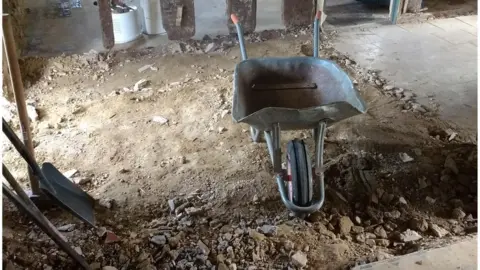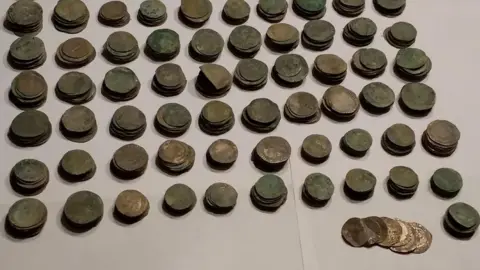ramonmercado
CyberPunk
- Joined
- Aug 19, 2003
- Messages
- 58,321
- Location
- Eblana
Likely a Civil War hoard.
A buried hoard of coins dating to the 16th and 17th Centuries has been found during renovation work on a cottage.
The cache of more than 1,000 gold and silver coins was discovered under an earth floor at South Poorton, Dorset.
One of the property's new owners, Robert Fooks, was digging with a pickaxe by torchlight when he found the trove in a pottery bowl.
Auctioneers hope to sell the collection for between £15,000 and £30,000.
 Becky Fooks
Becky Fooks
The hoard was found in a pottery bowl buried in a bare earth floor
Mr Fooks' wife Becky said her husband was spending evenings in the cottage after work to increase the height of the room and install underfloor heating before they moved in.
She said: "He came across a mass of coins covered in mud and put them in a bucket. He didn't stop and study them. He's a worker - when he's intent on something he cracks on."
Mrs Fooks said it was only the following day that she examined the coins and realised how old they were.
"You can clearly see the date. Some of the gold coins were easy to read, really clean," she said.
 Becky Fooks
Becky Fooks
Auctioneers have valued the collection at more than £15,000
The hoard, discovered in October 2019, was returned to the couple this year after expert analysis and legal work. The British Museum guessed they were deposited early in the English Civil War (1642-51) by a landowner trying to keep his wealth safe.
The collection, including James I and Charles I gold coins and Elizabeth I silver shillings, is being sold by Duke's Auctions in Dorchester on Tuesday.
https://www.bbc.com/news/uk-england-dorset-68848975
Historical coin hoard found buried under Dorset cottage
8 hours agoA buried hoard of coins dating to the 16th and 17th Centuries has been found during renovation work on a cottage.
The cache of more than 1,000 gold and silver coins was discovered under an earth floor at South Poorton, Dorset.
One of the property's new owners, Robert Fooks, was digging with a pickaxe by torchlight when he found the trove in a pottery bowl.
Auctioneers hope to sell the collection for between £15,000 and £30,000.

The hoard was found in a pottery bowl buried in a bare earth floor
Mr Fooks' wife Becky said her husband was spending evenings in the cottage after work to increase the height of the room and install underfloor heating before they moved in.
She said: "He came across a mass of coins covered in mud and put them in a bucket. He didn't stop and study them. He's a worker - when he's intent on something he cracks on."
Mrs Fooks said it was only the following day that she examined the coins and realised how old they were.
"You can clearly see the date. Some of the gold coins were easy to read, really clean," she said.

Auctioneers have valued the collection at more than £15,000
The hoard, discovered in October 2019, was returned to the couple this year after expert analysis and legal work. The British Museum guessed they were deposited early in the English Civil War (1642-51) by a landowner trying to keep his wealth safe.
The collection, including James I and Charles I gold coins and Elizabeth I silver shillings, is being sold by Duke's Auctions in Dorchester on Tuesday.
https://www.bbc.com/news/uk-england-dorset-68848975

